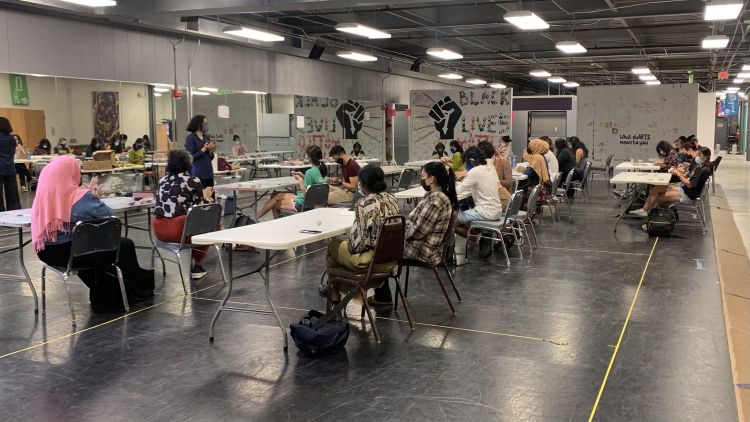When her journey to 99 Clay Vessels: The Muslim Women Storytelling Project began, multimedia artist and educator Alison Kysia did not intend to be traveling the United States to tell her story to classes or host pottery workshops.
Kysia turned to pottery as a form of personal healing during her time working at an interfaith organization in 2017.
“Because I am Muslim, I was hired to teach about Muslims, Islam and Islamophobia — and yet, the executive director and the board just held deeply entrenched ideas about who they thought Muslims should be. I tried to communicate many times that this was inauthentic,” Kysia said.
“They became increasingly combative, abusive and deeply racist. I would get home from work, and I was really distraught and compelled to pick up this clay and start making these pinch pots,” she added.
She channeled her emotions into making the pots to remind herself of her values. It became a therapeutic ritual, she says, as she sculpted the pots and repeated the 99 names of God in Islam. Repeating the names of God, or one of the names of God, is a common form of an Islamic practice called dhikr or “remembrance.”
As the pots sat on her shelf, Kysia realized the potential they had to be a form of healing to others as they were to her. She shared the idea with her friends, who thought it had great potential. One friend, Dr. Sabrina N’Diaye, suggested a storytelling project, much like the seminars she organizes in her work as a psychotherapist.
“I started thinking there are all these stories of bigotry that Muslim women have been through over the past 20 years. I wanted to create spaces for women to unload some of that and stop carrying it around by themselves,” Kysia said.
This fall, Kysia hosted a pottery workshop at Duke. The Center for Muslim Life and the Duke Islamic Studies Center co-sponsored the workshop. Maryam Arain, student development coordinator at the Center for Muslim Life, helped facilitate the discussion as she made her own pinch pots.
Arain said violent hate crimes and the increased surveillance and criminalization of Muslims in the U.S. are not the only consequences of 9/11 and the War on Terror.
“There have been far greater material consequences in places like Yemen, Iraq, Syria, Afghanistan and Pakistan. We must recognize that the ultimate goal of Islamophobia is to dehumanize Muslims to the extent that their deaths become irrelevant or justifiable,” said Arain, a Pakistani descendant.
There is also a gender-related aspect of the 99 Clay Vessels project.
“We know that Muslim women, particularly those who wear a scarf, experience Islamophobia not only as Muslim subjects but as gendered subjects,” Arain said. “It's important for Muslim women to have safe spaces to talk about their experiences with gender-based and race-based oppression without fear that their stories will be used to further oppress their communities.”
At the end of the workshop, Kysia encouraged students to leave some of their creations for the alternative 9/11 memorial she is working on.
Kysia also hosted a FOCUS class as part of the Geopolitics and Culture FOCUS cluster’s “9/11, Islam, and the Modern Middle East” course. Duke first-year student Nick Sortisio, who is enrolled in the course, attended.
“I was interested to learn more about the artistic elements of the project. The event certainly presented a novel interpretation of 9/11 and its aftermath,” said Sortisio, who was drawn to this particular event because he enjoys ceramics as a hobby.
Vidita Shah, who is also taking the course, agrees.
“I really enjoyed the different perspective that the presentation brought to our discussions of 9/11 and Muslim life in America,” she said.

Vishal Jammulapati, who is a first-year student majoring in international comparative studies, attended the class alongside Shah and Sortisio.
“I wanted to learn about her inspiration and unique artistic work. It opened my eyes to the importance of storytelling and using art as a community-building mechanism,” Jammulapati said.
Kysia envisioned the project to be just that, saying that she wanted to create community spaces for Muslim women.
“It’s about creating a space for them and letting the space be with whatever they need it to be,” said Kysia. “It’s really about giving them the gift of art. All the women who go through the workshop have to create a story.”
